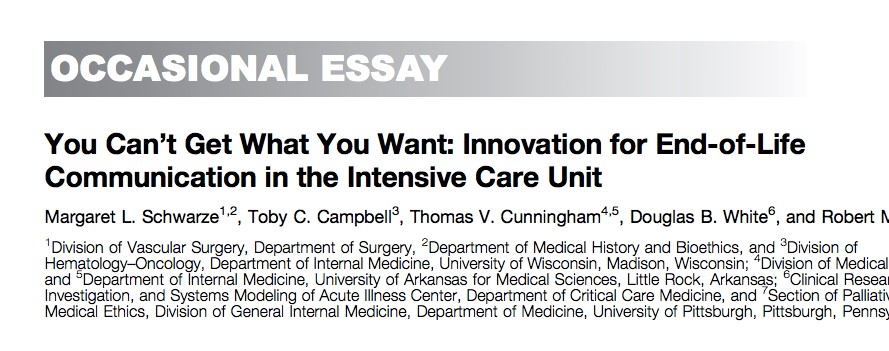I changed my mind. Since 1990 I had a question to help people make decisions about end-of-life medical treatments. 3.6 million copies and six editions of my Hard Choices for Loving People book have included this question I am now changing.
One essay in a medical journal convinced me in an instant. I read it and it rang true. Dr. Margaret L Schwarze, et. al. wrote “You Can’t Get What You Want: Innovation for End-of-Life Communication in the Intensive Care Unit.” I just recently found this piece from January 2016.

The question I am changing is used so much by doctors, nurses, chaplains and social workers it is almost reflexive. Say you have a demented 85-year-old patient in a nursing home and the family is having to decide about CPR. After explaining the options and prognosis the doctor may then ask, “What would your mother want?” We in healthcare ask this all the time.
We have been well-meaning all these years. We are trying to get the opinion of a patient who can no longer give an opinion. We are being advocates for patient autonomy through the substituted judgement of a family member. The essay authors see several problems with this question.
Several problems with this question
“First, it encourages the family to reflect on treatments, like life support or comfort care, rather than goals.” I am reminded of the doc who cared for my mother. Her dementia had been advancing for years and then she fell and broke her hip. His question to my sister and me was, “How did your mother feel about her dementia?” In many words we told him she hated it and he said, “Okay, here is what we are going to do.” He never asked what treatment plan she would want. He wanted to know how she felt about her underlying condition.
The essay continues with the flaws in the “want” question. “Second, it can shut down discussion; once the family makes a choice, what else is there to say?” The family of the 85-year-old may respond, “Mom loved life. She wants to live. Do everything to keep her alive.” Does she want to live on a machine for weeks or months? Would she want to live not knowing her family? What about the pain and suffering aggressive medical care can inflict? The “want” question cut off this discussion of the patient’s values.
“Third, want is aspirational and evokes fantasies. When we ask patients or their surrogates what they want, we release the constraints of the decision-making context and allow consideration of possibilities outside the boundaries of clinical reality.” A healthcare professional has perhaps seen hundreds of patients like the one where a family is now making a decision about life-prolonging procedures. The docs and nurses know the almost certain disability and/or death awaiting this patient. The family dreams of wanting mom back to how she was before. It’s not happening no matter what is done in most cases.
So, what do we ask if not “what would your mother want?”
Since the first edition of Hard Choices in 1990 I have included “What does the patient want?” as one of five questions to ask as an aid to making end-of-life decisions. Here is what I am changing it to with the next printing:
- What does the patient think about their current and probable future condition? A patient with decision-making capacity can speak for themselves. If they are unable to express an opinion then try to imagine how they would think about the state they find themselves in. If the likely outcome of further life-prolonging procedures would lead to increasing disability and/or greater mental decline, what would they say about that? The purpose of this question is to try and imagine what the patient values most.
This is a more open and honest discussion of the patient’s values rather than a yes or no about a particular treatment. The family can inform the medical staff about what the patient felt was important. Hopefully, the staff can draw up a treatment plan that affirms those values and is realistic about what further treatment can and cannot accomplish.
In the summer of 1968, as a college student, I did ministry work on the streets of Newark, New Jersey a year after the city had been engulfed in riots. My mentor, Bill Iverson, encouraged us to follow Socrates and ask people questions instead of trying to preach at them. He had a great saying which applies here.
“Ask people the right question and they will give you the right answer.”

